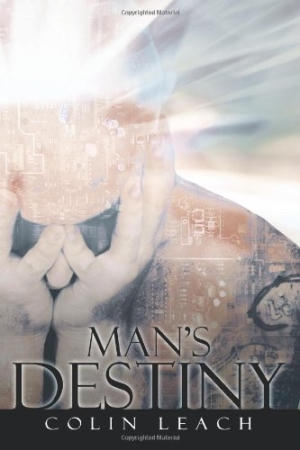Man's Destiny
“The impossibility of conceiving that this grand and wondrous universe, with our conscious selves, arose through chance, seems to me the chief argument for the existence of God,” said evolutionist Charles Darwin in a statement often quoted by the religious faithful. “But whether this is an argument of real value, I have never been able to decide,” concluded Darwin.
In Man’s Destiny, Colin Leach continues where Darwin stopped. He juxtaposes scientific factoids and Bible verses to reveal “the real reason why God created Man”—homo sapiens’ superior intelligence. He argues that God created man and endowed him with advanced intelligence at precisely the point when earthly conditions were optimal for sustaining human life, thus proving, he suggests, that God guides all scientific processes with mathematical precision.
Leach’s loosely constructed theory links several disparate elements: the Genesis account of creation, the Big Bang theory, the reason the Great Pyramid at Giza was constructed, why God sent the Israelites to Egypt, the dawning of the Age of Aquarius, the epic battle between Churchill and Hitler during World War II, and how cerebral neurons function.
The book ends with a chapter on how man can save himself from the disastrous events foretold in the Book of Revelation. According to Leach, man’s final challenge is to deal with the collapse of the universe, when, he explains, the Andromeda galaxy will collide with ours, creating a colossal galaxy with unimaginable power. “The entire process,” Leach asserts, “stems from programmes God wrote and installed in nuclei, hence throughout [time] atoms have been aligning themselves according to the genome that He encrypted in their nuclei.” After the collision, humans will construct a new Garden of Eden, completing God’s “victory over the Devil.” Precisely how that gargantuan task will be accomplished, Leach fails to explain.
Man’s Destiny is Leach’s first foray into both theological and scientific writing. A computer specialist and chess expert, he has published more than fifty books on chess. His love of the game comes into play in Man’s Destiny as well, when he suggests that God and the Devil are engaged in a strategic match of cosmic significance and argues that the Arab-Israeli conflict is “God’s game of chess.”
Leach’s analyses are, at times, interesting, even thought provoking. “Souls are the life-force inside every living thing,” he states. “They are God’s equivalent of silicon chips in computers.” But Leach’s proofs are extraordinarily weak. He asserts that the human mind “must have the equivalent of the computer mouse, and we believe it is our personality.” He claims that instantaneously recalled visual images would be possible only if each image was stored on a single neuron, a claim for which no scientific proof currently exists. Oftentimes, his “proofs” are quoted Bible verses. And, on occasion, his statements are flat-out wrong. Twice, for example, he asserts that the destruction of the World Trade Center occurred on September 9, 2001 (rather than September 11). If he is wrong on such an undisputed fact, where else is his analysis flawed?
Individuals interested in the difficult and worthwhile task of reconciling theological and scientific explanations of the mysteries of the universe may be drawn to Colin Leach’s book. That said, with its rambling style and odd proofs, Man’s Destiny is likely not destined for a wide readership.
Reviewed by
Nancy Walker
Disclosure: This article is not an endorsement, but a review. The publisher of this book provided free copies of the book and paid a small fee to have their book reviewed by a professional reviewer. Foreword Reviews and Clarion Reviews make no guarantee that the publisher will receive a positive review. Foreword Magazine, Inc. is disclosing this in accordance with the Federal Trade Commission’s 16 CFR, Part 255.

